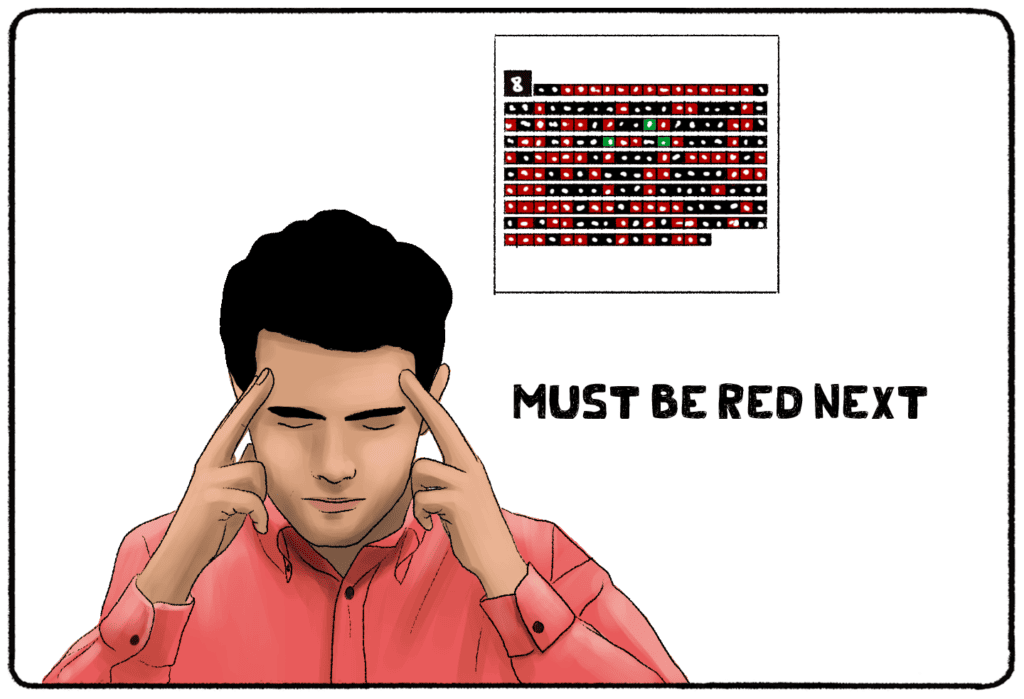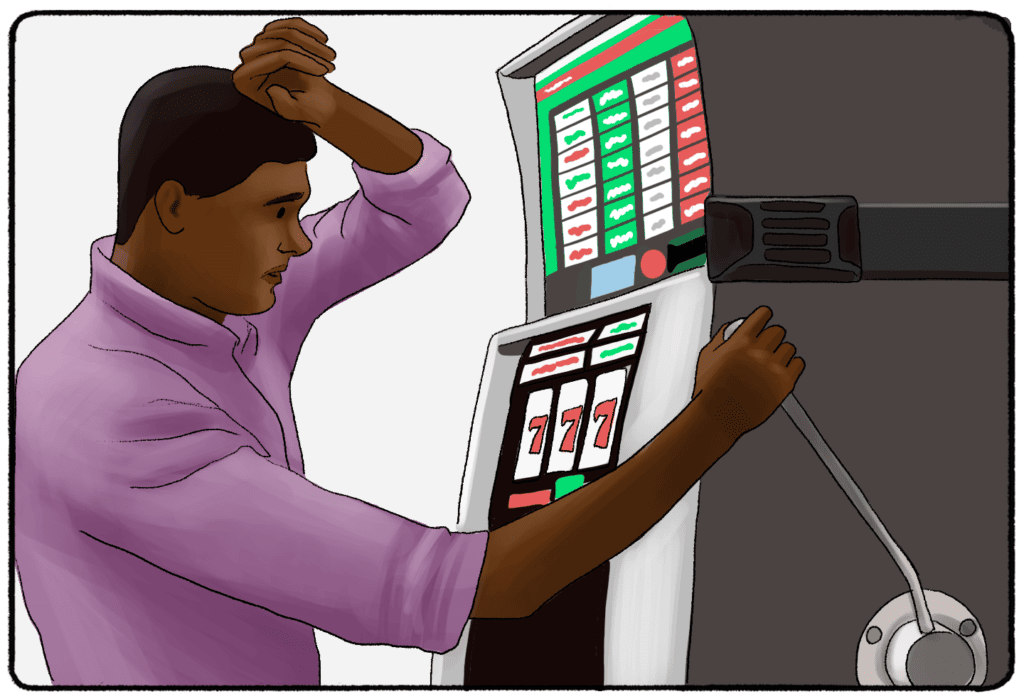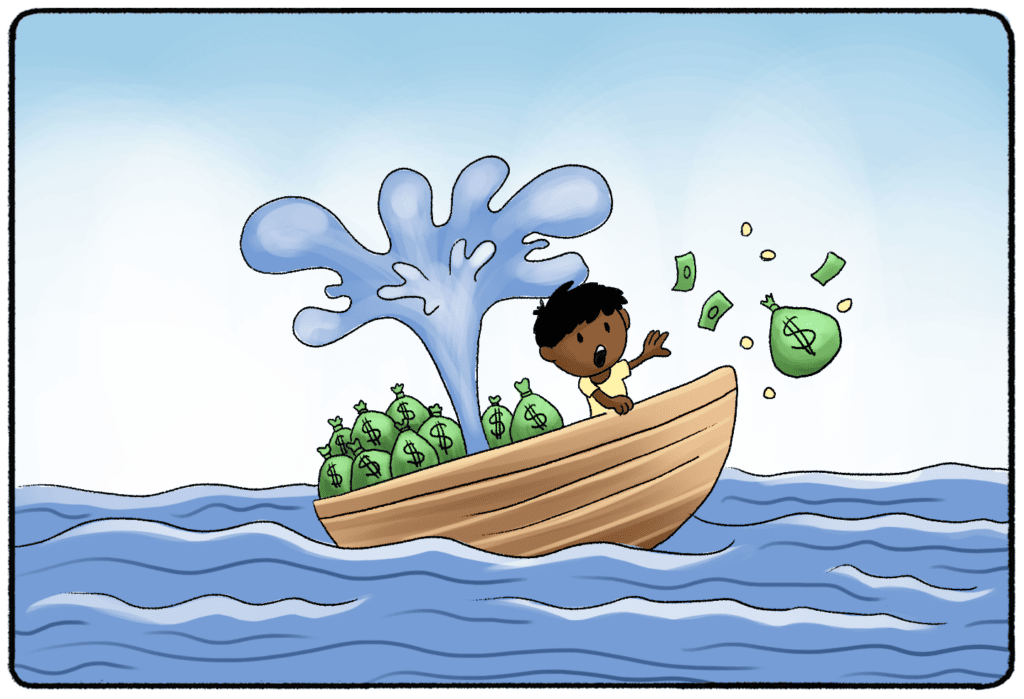Our brains have to make many decisions quickly: whether we want to cross the street, leave our jobs, or bet on red or black. But biases and fallacies, like the gambler's fallacy, cloud our judgment and may lead us astray.
What Is The Gambler’s Fallacy?
The gambler's fallacy is a bias in which we let past events influence our decisions and predictions about what will happen next. But this bias is based on fallacy or a mistaken belief. Each action is independent of the actions before it.
In roulette, it might seem like the ball has a 50/50 chance of landing on either black or red every time. However, this isn't strictly true due to the presence of the green zero slot (and, additionally, the double zero in American roulette). These green slots slightly tilt the odds, making the probability of the ball landing on black (or red) a bit less than 50/50. Many people, nonetheless, believe that if the ball lands on black once, it will surely land on red next. While it's true that the chances of the ball landing on black 26 times in a row are considerably smaller than it landing on black just twice or three times consecutively, the presence of these green slots means that each spin is independent. The exact outcome cannot be predicted based solely on previous results.

Is Gambler's Fallacy Real?
In 1913, gamblers at the Monte Carlo Casino witnessed a staggering and memorable sequence at the roulette table. The ball landed on black 26 times in a row. Now, the sheer improbability of that happening, with the odds being 1 in 66.6 million, made it an astonishing event in gambling history. But what makes this event particularly significant in the context of the gambler's fallacy is not just the rarity of such a sequence but how people reacted to it.
Imagine being in the shoes of gamblers at Monte Carlo that day. After seeing the ball land on black repeatedly, a majority would naturally start to assume that a red result was imminent. It felt intuitively "due." This belief led many to keep betting larger and larger sums on red, with the expectation that their chance of winning was increasing with every black result. In reality, however, each spin of the roulette wheel is an independent event, and the past sequence of results has no bearing on future outcomes. The misconception that the ball was more likely to land on red after a series of black results is a classic manifestation of the gambler's fallacy.
To drive the point home, consider the 27th spin after the 26 consecutive black results. Many might think the chances of another black result would be slim, but in actuality, considering the green zero (and double zero in American roulette), the probability of the ball landing on black remained just slightly under 50/50.
In essence, the Monte Carlo event is a poignant real-world example of how even experienced gamblers can fall prey to the gambler's fallacy, allowing their perceptions of patterns and sequences to override the reality of independent events and true probabilities.
More Examples of the Gambler's Fallacy
Other Casino Games
The gambler’s fallacy often leads people astray while they’re in the casino. Think of all those who continued to bet on red at Monte Carlo. I’m sure some of those gamblers put a lot of money on red, thinking their chances at winning big were larger just because the ball kept landing on black.
But this doesn’t just happen at the roulette table. Many people will stay at the slots for hours, believing that although they lost time after time again, their chances of winning will somehow increase.

The gambler’s fallacy isn’t just a phenomenon that occurs within the walls of a casino. In the “real world,” this logical fallacy can have some pretty serious effects on the ways people make decisions and conduct business.
Financial Gambles
Take loans. Approving or rejecting loans can sometimes feel like a gamble to loan officers. Studies show that loan officers are more likely to reject a loan sitting in front of them if they have approved the last loan that came across their desk. Researchers think that 5% of loans are affected by this fallacy.
This can have a huge impact on a person’s ability to buy a house or start a business, but further research shows that this fallacy can have an even more significant impact.
Legal Gambles
Asylum judges are not immune to the gambler’s fallacy. Data shows that they are more likely to approve a person’s application if they have denied the previous application, and vice versa.
How to Explain the Gambler's Fallacy
The gambler’s fallacy goes beyond how we make decisions - some argue that it affects how we make sense of the world. Remember, the gambler’s fallacy is a bias influenced by past events. We may link our decision to stay at the slots because of past events. But we may also explain what is happening now based on what happened in the past.
We use the gambler’s fallacy to establish patterns. We may get sick and blame it on the bread that we ate before. If we get sick a second time after eating bread, we are very likely to believe that we have an intolerance or allergy involving gluten. But connecting our stomachache to what we ate before isn’t always based on logic or correct probability, just like connecting the ball landing on red to landing on black before (or vice versa) isn’t always based on logic. Independent events are just that - independent events.
How to Avoid The Gambler's Fallacy
I’m not saying that people with stomach aches shouldn’t write off certain foods or that you should go to the casino and only bet on one color or number. But I am telling you about the gambler’s fallacy so you can be more aware of if you’re using it in your life.
Logical fallacies and biases affect the way we make decisions, form arguments, and predict what is going to happen in the future. Since these fallacies are based on falsehoods, the results may not be so great. The more you are aware of these logical fallacies and biases, like the confirmation bias or experimenter bias, the easier it will be for you to step back, make a proper assessment based on facts, and make better sense of what is happening around you.
Sunk Cost Fallacy vs. Gambler's Fallacy

The sunk-cost fallacy and gambler's fallacy are often confused, but they are quite different. The sunk-cost fallacy leads us to follow through with decisions we have already "paid" for. Gambler's fallacy leads us to make decisions based on past results, whether or not we had "paid" for them. You can fall into the trap of gambler's fallacy, for example, by betting on red after a ball landed on black, whether or not you lost money in the previous spin.
The Interrelation Between Confirmation Bias, Sunk Cost Fallacy, and Gambler's Fallacy
Our cognitive processes, although advanced and intricate, are not immune to errors. Some various biases and fallacies influence our decision-making, and while each has distinct characteristics, they can sometimes intersect in how they affect our judgments. Let's explore the connection between three cognitive tendencies: Confirmation Bias, Sunk Cost Fallacy, and Gambler's Fallacy.
Confirmation Bias
Definition: This is the tendency to search for, interpret, and remember information in a way that confirms our pre-existing beliefs.
Connection: With Sunk Cost Fallacy: When individuals invest in a particular course of action (be it time, money, or emotion), they might be more likely to seek out information that confirms they made the right choice, even if evidence suggests otherwise. This is where confirmation bias amplifies the effects of the sunk cost fallacy.
With Gambler's Fallacy: Someone might believe that "luck" has to change eventually. They may then selectively remember past instances that seem to confirm this belief while disregarding instances that contradict it.
Sunk Cost Fallacy
Definition: The tendency to continue a course of action because of the time, money, or effort already invested, even if it is clear that persisting with that action might lead to undesirable outcomes.
Connection: With Confirmation Bias: As mentioned, individuals might become more susceptible to information that aligns with their current course of action because they've already invested in it, and confirmation bias will make them lean towards affirming data.
With Gambler's Fallacy: After repeatedly investing in an outcome that hasn't come to fruition (e.g., continuously betting on red after multiple black outcomes in roulette), one might feel that they've invested too much to back out, thinking their luck "has to" change soon.
Gambler's Fallacy
Definition: The mistaken belief that if something happens more frequently than expected over a short period, it's likely to happen less frequently in the future, and vice versa.
Connection: With Confirmation Bias: A person might have the erroneous belief that "runs" of luck or specific outcomes are indicative of future results. They then might be more attentive to patterns that seem to confirm this fallacy, overlooking the random nature of independent events.
With Sunk Cost Fallacy: After experiencing a streak of losses, a gambler might think, "I've come this far; the tide has to turn soon," and keep investing more based on the amount they've already lost.
While these cognitive tendencies can function independently, their interrelation is a testament to how complex human decision-making can be. The overlap between confirmation bias, sunk cost fallacy, and gambler's fallacy exemplifies the multifaceted ways our judgments can be skewed. Recognizing their interplay can be instrumental in making more informed and rational decisions.
Quiz
Let’s test your knowledge of the Gambler’s Fallacy.
Question 1:
A coin has been flipped 12 times. 10 of those flips have resulted in “heads.” What is the likelihood that it will be tails the next time you flip it?
Answer:
50/50
Question 2:
True or False: The Gambler’s Fallacy is just limited to gamblers.
Answer:
False. Everyone is affected at some point by the Gambler’s Fallacy. It’s a common bias that all humans experience.
Last question:
The Gambler’s Fallacy is a _____ fallacy we should be aware of when making judgments and decisions.
Answer:
Logical
